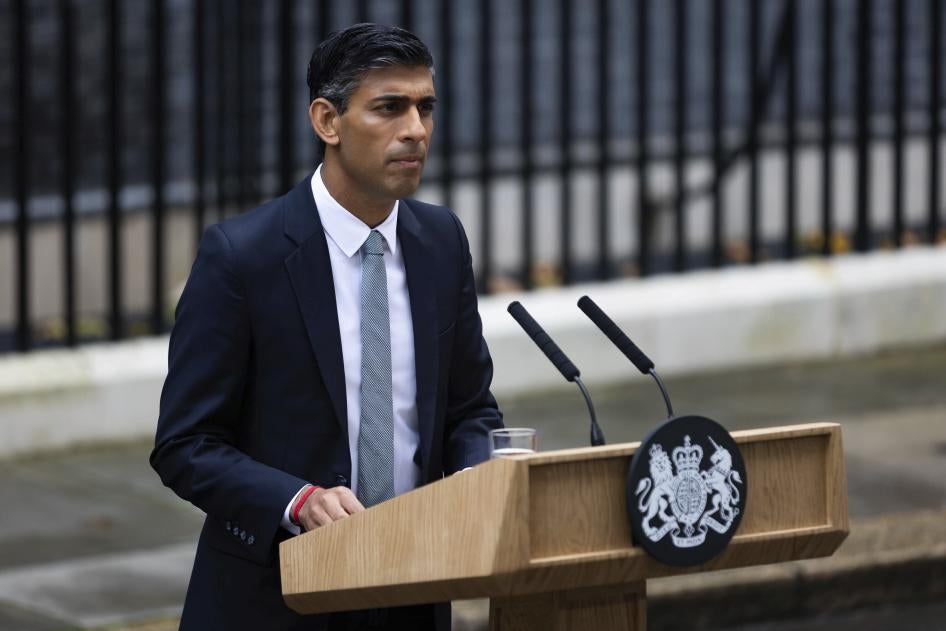Rishi Sunak Needs to Reaffirm Britain’s Commitment to Human Rights
Yasmine Ahmed
Director, United Kingdom
HRW
@YasmineAhmed001

Rishi Sunak makes his first speech as British prime minister outside 10 Downing Street, London, October 25, 2022.

Rishi Sunak makes his first speech as British prime minister outside 10 Downing Street, London, October 25, 2022.
© 2022 KGC-254/STAR MAX/IPx via AP Photo
These are unprecedented times in modern British politics. Rishi Sunak has become the third Prime Minister in less than two months, taking the helm during a political, social, and economic tempest. The task ahead of him is herculean, with an estimated 8 million people in the UK struggling to pay their bills and the country's reputation widely derided in international media.
Touted as the candidate who could steady the ship, Sunak's cabinet appointments have already sparked concerns about the direction of his government, particularly regarding human rights.
Among Sunak’s most controversial appointments is Suella Braverman who returns as home secretary, just six days after resigning for breaching the ministerial code. Braverman infamously told a reporter during her previous term that it was her “dream” and “obsession” to see asylum seekers expelled to Rwanda. If this weren’t concerning enough, last week, in a column for the Telegraph last week, she urged the UK government to “take a firm line on trans ideology” and called for measures that would limit the “impact” of modern slavery laws and the European Convention on Human Rights (ECHR). If the UK were to withdraw from the ECHR, something Braverman has called for and Sunak has suggested he would consider, it would join Russia as the only other country that has done so.
Joining Braverman is Dominic Raab, who returns to the role of Justice Secretary and Deputy Prime Minister less than two months after he was sacked by former Prime Minister Truss. Another critic of the ECHR, Raab is perhaps best remembered for tabling the controversial and widely criticized bill of rights. This bill would repeal and replace the Human Rights Act, which gives life to the ECHR in UK domestic law, and undermine rights protections in the UK. Although the plan was shelved briefly under Truss’ leadership, it remains before Parliament, ready to be resurrected. This mustn’t happen. At a moment of incredible upheaval, now is not the time to strip people of their rights and renege on the UK’s international commitments.
Rishi Sunak has promised to rule with compassion, a statement that seems at odds with these appointments. If his government is to “have integrity, professionalism and accountability at every level,” he needs to stand up for human rights and reaffirm his commitment to the ECHR and Human Rights Act.
These are unprecedented times in modern British politics. Rishi Sunak has become the third Prime Minister in less than two months, taking the helm during a political, social, and economic tempest. The task ahead of him is herculean, with an estimated 8 million people in the UK struggling to pay their bills and the country's reputation widely derided in international media.
Touted as the candidate who could steady the ship, Sunak's cabinet appointments have already sparked concerns about the direction of his government, particularly regarding human rights.
Among Sunak’s most controversial appointments is Suella Braverman who returns as home secretary, just six days after resigning for breaching the ministerial code. Braverman infamously told a reporter during her previous term that it was her “dream” and “obsession” to see asylum seekers expelled to Rwanda. If this weren’t concerning enough, last week, in a column for the Telegraph last week, she urged the UK government to “take a firm line on trans ideology” and called for measures that would limit the “impact” of modern slavery laws and the European Convention on Human Rights (ECHR). If the UK were to withdraw from the ECHR, something Braverman has called for and Sunak has suggested he would consider, it would join Russia as the only other country that has done so.
Joining Braverman is Dominic Raab, who returns to the role of Justice Secretary and Deputy Prime Minister less than two months after he was sacked by former Prime Minister Truss. Another critic of the ECHR, Raab is perhaps best remembered for tabling the controversial and widely criticized bill of rights. This bill would repeal and replace the Human Rights Act, which gives life to the ECHR in UK domestic law, and undermine rights protections in the UK. Although the plan was shelved briefly under Truss’ leadership, it remains before Parliament, ready to be resurrected. This mustn’t happen. At a moment of incredible upheaval, now is not the time to strip people of their rights and renege on the UK’s international commitments.
Rishi Sunak has promised to rule with compassion, a statement that seems at odds with these appointments. If his government is to “have integrity, professionalism and accountability at every level,” he needs to stand up for human rights and reaffirm his commitment to the ECHR and Human Rights Act.
No comments:
Post a Comment